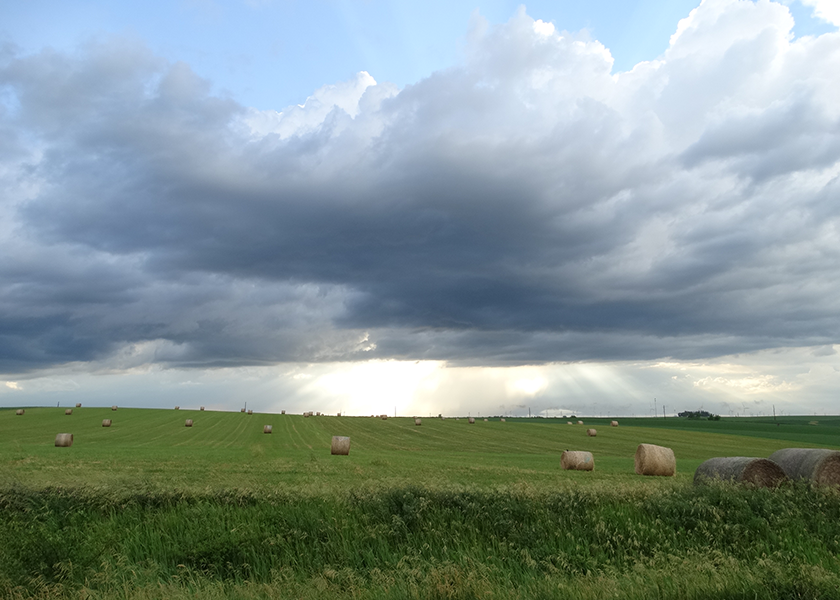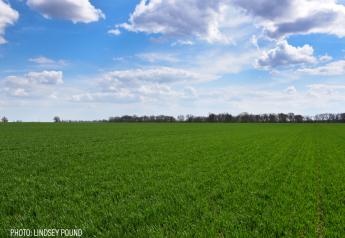Evening Report | June 12, 2023

Check our advice monitor on ProFarmer.com for updates to our marketing plan.
Corn condition drops more than expected... As of Sunday, USDA rated 61% of the corn crop as “good” to “excellent,” down three points from last week and one point lower than traders expected. The portion of crop rated “poor” to “very poor” increased two points to 8%.
|
|
This week |
Last week |
Year-ago |
|
Very poor |
2 |
1 |
1 |
|
Poor |
6 |
5 |
4 |
|
Fair |
31 |
30 |
23 |
|
Good |
51 |
53 |
59 |
|
Excellent |
10 |
11 |
13 |
USDA reported 93% of the corn crop was emerged, six points ahead of the five-year average for the date.
Soybean condition also drops more than anticipated... USDA rated 59% of the soybean crop as “good” to “excellent,” down three percentage points from last week and one point lower than traders expected. The portion of crop rated “poor” to “very poor” increased two points to 9%.
|
|
This week |
Last week |
Year-ago |
|
Very poor |
2 |
2 |
1 |
|
Poor |
7 |
5 |
4 |
|
Fair |
32 |
31 |
25 |
|
Good |
51 |
53 |
59 |
|
Excellent |
8 |
9 |
11 |
USDA reported 96% of the soybean crop was planted, 10 points ahead of average. The crop was 86% emerged, 16 points ahead of average for the date.
Cotton conditions decline... USDA rated 49% of the cotton crop as “good” to “excellent,” down two points from last week. The amount of crop rated “poor” to “very poor” increased three points to 15%. The Texas crop was rated 30% “good” to “excellent” and 23% “poor” to “very poor.”
|
|
This week |
Last week |
Year-ago |
|
Very poor |
2 |
1 |
3 |
|
Poor |
13 |
11 |
16 |
|
Fair |
36 |
37 |
35 |
|
Good |
40 |
43 |
41 |
|
Excellent |
9 |
8 |
5 |
USDA reported 81% of the crop was planted, five points behind average. Cotton emergence stood at 11%, three points behind normal for the date. Texas planting was 10 points behind, with squaring three points behind at 72% and 12%, respectively.
Spring wheat condition drops more than expected... USDA rated 60% of the U.S. spring wheat crop as “good” to “excellent,” down four percentage points from last week. Traders expected a one-point decline. The amount of crop rated “poor” to “very poor” increased five points to 7%.
|
|
This week |
Last week |
Year-ago |
|
Very poor |
1 |
0 |
2 |
|
Poor |
6 |
2 |
7 |
|
Fair |
33 |
34 |
37 |
|
Good |
56 |
58 |
49 |
|
Excellent |
4 |
6 |
5 |
Spring wheat planting was equal to the five-year average of 97%. Emergence was three points ahead of average at 90%.
Winter wheat harvest just behind normal... Winter wheat harvest advanced four points to 8% done as of Sunday. That was one point behind average and two points slower than traders expected. Harvest stood at 42% in Texas (46% average), 28% in Oklahoma (26%) and 1% in Kansas (2%).
Guterres worried Russia will end Black Sea grain deal... United Nations Secretary-General Antonio Guterres said he is concerned Russia will exit the Black Sea grain deal on July 17 when the current agreement ends. “I am concerned and we are working hard in order to make sure that it will be possible to maintain the Black Sea initiative and at the same time that we are able to go on in our work to facilitate Russian exports,” Guterres said.
Russia remains dissatisfied with the deal, in particular the lack of effort to restart its ammonia shipments via a pipeline that used to carry supplies to a Ukrainian port prior to the war.
Ukraine claims Polish farmer subsidies exceed WTO commitments... Ukrainian Deputy Economy Minister Taras Kachka argues that subsidies given to Polish farmers in response to a surge in Ukrainian grain exports to the country breach World Trade Organization (WTO) rules. Kachka made the statement at an International Grains Council conference in London, suggesting that although the issue may seem minor, it could potentially lead to global trade disturbances. The increasing flow of Ukrainian grain and agricultural products has been causing tension with Eastern European countries that share borders with Ukraine.
OMB nearing end of review of EPA’s RFS plan... The Office of Management and Budget (OMB) has scheduled 10 meetings to discuss the final rule, resulting in consultations with 35 different companies/groups — significantly more than the 15 meetings held for the proposed rule in late 2022. EPA has promised to finalize the plan by June 14, with an announcement expected shortly after, likely yet this week.
Recent reports indicate EPA may remove provisions relating to awarding renewable credits for electricity generation from renewable sources that power electric vehicles (EVs). If true, attention will be on EPA’s guidance regarding the timeline for regulations in this area.
Biodiesel and renewable diesel stakeholders will also be looking to see if the EPA has increased volume requirements for these fuels in the final plan, as previous increases have often been met with disappointment.
NMPF outlines farm bill priorities... The National Milk Producers Federation (NMPF) has outlined its priorities for the new farm bill, including measures related to commodities, conservation, trade and nutrition. Key proposals include continuing and improving the Dairy Margin Coverage (DMC) risk management program and updating milk pricing formulas under the Federal Milk Marketing Order (FMMO). For conservation, NMPF seeks policies supporting the dairy industry’s goal of reaching net-zero greenhouse gas emissions by 2050 and emphasizes feed and manure management. In terms of trade, NMPF prioritizes increased funding for trade promotion provisions and protecting the use of common food names. Nutrition-wise, NMPF aims to enhance federal nutrition programs such as SNAP by promoting the purchase of dairy products and endorsing the SNAP Dairy Nutrition Incentives Program, which expands healthy milk options for beneficiaries.
Bill would make NOAA independent... House Republicans are pushing to make the National Oceanic and Atmospheric Administration (NOAA) an independent agency, which would remove it from the control of the Commerce Department. The NOAA Organic Act, introduced by Rep. Frank Lucas (R-Okla.), would formalize the agency’s statutory authorities, remove layers of political oversight, and enshrine the scientific advisory board and scientific integrity policies into law. Lawmakers argue that the move will reduce bureaucracy and help the agency reach its full potential.
The proposal has received support from former NOAA leaders who have experienced difficulty in collaboration between Commerce and NOAA staff. However, no Democrats have signed onto the bill so far.
Advocates of the proposal argue that an independent NOAA is particularly important now due to the challenges presented by climate change.
Lawmaker proposes 60% tax on land purchases by U.S. adversaries... House Ways and Means Committee Chair, Rep. Jason Smith (R-Mo.), has sponsored a bill that seeks to prevent foreign adversaries, such as China, Russia, Iran, North Korea, Cuba and Venezuela, from acquiring U.S. agricultural land by imposing a 60% excise tax on their purchases. The measure, co-sponsored by Rep. Beth Van Duyne (R-Texas), is an extension of state and federal efforts to restrict farmland ownership to Americans and U.S. allies, aiming to bolster food and economic security.
Foreign entities own 3.1% of America’s private land (40.8 million acres of agricultural land), with China owning about 0.9% of the total. The Smith/Van Duyne bill also proposes a 10% to 50% excise tax on purchases by publicly traded companies with up to 50% ownership by disqualified persons.
Texas has already banned Chinese firms’ access to the state power grid, setting a precedent for further restrictions.
Summers: U.S. economy ‘very, very hot’... Former Treasury Secretary Lawrence Summers recently commented on the U.S. economy, describing it as “very, very hot,” albeit not as strong as it was six to 12 months ago. He stated that the U.S. is currently experiencing an underlying inflation rate of 4.5% to 5%.
Summers mentioned that soft landings tend to be more wishful thinking rather than reality, and highlighted potential pockets of distress in commercial real estate. He also emphasized the importance of stronger U.S./China ties, advocating for greater cooperation on issues such as climate change and debt diplomacy for low-income countries. Summers believes the best way to ensure peace is to promote interdependence and intertwining between the two countries, so that both societies are invested in each other’s success.






